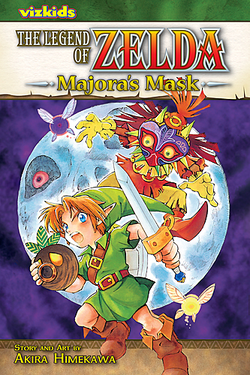The Legend of Zelda: Majora's Mask (Manga)
Games | ||
Cost | ¥700 (Japan) | |
Release Date | ||
| Credits | ||
|---|---|---|
Publisher | ||
Author | Himekawa Akira | |
Artist | Himekawa Akira | |
| Attributes | ||
Length | 205 pages | |
Size | 18 x 12.8 x 1.8 cm | |
ISBN | ||
| Media | ||
Gallery | ||
This is the official manga for Majora's Mask. It is written and illustrated by Akira Himekawa, the same artist who made many of the other Zelda mangas. It is in black and white with some pretty nicely illustrated drawings. The story differs from the game a bit and the differences can be seen below. There is also one bonus chapter at the end of the Manga that reveals the origin of Majora's Mask.
This manga was released in Japan on February 26, 2001. An English adaptation of this manga was released by Viz Media on February 3, 2009 as Volume 3 of their Zelda comic series.
Alternative titles
- Zelda no Densetsu: Mujura no Kamen (Japanese)
- ゼルダの伝説 ムジュラの仮面 (Japanese)
Synopsis
After Link seals Ganondorf in the Sacred Realm, peace returns to Hyrule. But soon Link's old friend Navi goes missing. While wandering through the forest in search of Navi, he meets Skull Kid. The mischievous Skull Kid steals the Ocarina of Time from Link and turns Link into a Deku Scrub! Setting things straight this time will take Link on an amazing journey to a parallel world where he meets new friends and new enemies!
Chapter
- "Skullkid and the Demon Mask"
- "Link the Deku Scrub"
- "The Happy Mask Shop"
- "Odolwa: God of Woodfall"
- "The Monster of Snowhead"
- "The Great Bay"
- "Anju and Kafei"
- "Stop the Moon!"
- "Fierce Diety Link"
- "Original Side Story" (Bonus Chapter)
Differences Between the Game and the Manga
- Majora's Mask was an ancient and dangerous artifact made from the armor of a legendary and evil beast named Majora that was danced to dying exhaustion by a being disguised as a human traveler.
- There is a story about Link before he meets the Skull Kid.
- Link never enters any temples in the manga.
- Link automatically learns bubble attack when first transformed into Deku Link.
- The Happy Mask Salesman was awake when he was robbed of Majora's Mask when in the game he was knocked out by the Skull Kid.
- Link does not use the Song of Healing, instead using the Song of Time to heal himself, Darmani, and Mikau.
- The Deku King hasn't falsely accused the Monkey of kidnapping the Deku Princess. Humorously, he instead captured various creatures such as Wolfos, Snappers, and bugs.
- Link fights Odolwa in the Deku Palace rather than Woodfall Temple.
- Darmani had just died in the manga rather than have died long ago.
- The Gorons are unaware of Darmani's death.
- The Goron Elder's Son is crying that Darmani is dead when in the game he was crying that his father was gone and seemed to know nothing about Darmani's death. As such, the Goron Elder never left to find Darmani.
- Link fights Goht on the mountain side rather than in Snowhead Temple.
- The "Indigo-go's" were referred to as "Dal Blue".
- Mikau is seen being injured and thrown into the bay instead of being found floating in the waters.
- Link encounters the pirates in a ship in the Great Bay, rather than infiltrating their fortress.
- There is only one Zora Egg instead of seven.
- Ling fights Gyorg far out in the Great Bay rather than in the Great Bay Temple.
- The Anju-Kafei sidequest is a larger part of the story, and more emotional.
- Kafei's Sun's Mask is not stolen by Sakon.
- There is only one Twinmold boss instead of two.
- Link doesn't transform into a Giant to beat Twinmold.
- Epona is not found until the end of the game.
- Link uses the Fierce Deity's Mask when on top of the Clock Tower and kills the four masked children as soon as he enters the Moon.
- Link is required to use the Fierce Deity's Mask.
- The Happy Mask Salesman has a more malovolent role in the manga.
- The Happy Mask Salesman is attacked by Fierce Deity Link when he tries to run off with Majora's Mask.
- Link rescues the four giants in one three-day cycle, which is impossible to do while completing the Anju-Kafei sidequest.




